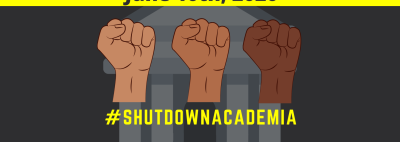

COE Dean Rice Statement on June 10 ShutDownAcademia Activities
Dear College of Education community,
Like so many of you, I have been gripped by the events surrounding and following the tragic death of George Floyd in Minneapolis. I find myself filled with sadness, anger, and frustration as I witness the intractable racism, discrimination, injustice, and violence that continues to plague communities, large and small, across the country.
Sadly, this is a road well-traveled for our nation. Tragedies like the deaths of George Floyd, Breonna Taylor, Freddie Gray, Michael Brown, Trayvon Martin, Lt. Richard Collins III, and so many others expose the implicit and explicit racism experienced by Black people every day in so many ways. Inequity is pervasive. The current events are unfolding the context of a global pandemic that has revealed stark and troubling inequities in health care, and many of us know well the disparities in education that undermine the life opportunities of black and brown individuals in our communities.
We know that academia also has its own barriers for Black students, faculty and staff, especially in the realm of STEM. Today, June 10th, we are proud to jointly support "#ShutDownAcademia," an initiative designed to highlight the need for all of us to confront anti-Black racism and our unconscious biases, actively work for equality and opportunity, and champion diversity and inclusion in colleges and universities. The initiative also includes “#ShutDownSTEM,” a specific effort to highlight the need for diversity in STEM disciplines and the particular challenges Black academics and professionals face within these disciplines.
We encourage you to participate in the grassroots action and awareness campaigns taking place today in any way that is meaningful and productive to you. Each of our university’s colleges and schools will participate in different ways. However, we urge everyone to spend time and energy today learning more about the cultural, institutional and academic inequalities highlighted in these campaigns—as well as how they contribute to blocked access in higher education.
Some UMD resources for learning include TERP Allies, which raises awareness of the biases that emerge in everyday work settings, and the Office of Diversity and Inclusion, which provides training on how to recognize and respond to anti-Black racism. You can also visit go.umd.edu/UMDSolidarity for events and opportunities to connect, reflect, learn and act.
A few opportunities this week include:
- A School of Public Health event today, June 10th, at noon, “Building Community for Anti-Racist Action,” to be presented on Facebook Live.
- An Anti-Racism Teach-In, Thursday, June 11 at 12 pm EST, http://go.umd.edu/teachin. This week’s conversation will feature Dr. Roger L. Worthington (Center for Diversity and Inclusion in Higher Education/College of Education), Dr. Mia Smith-Bynum (School of Public Health), Dr. Cynthia Kay Stevens (Undergraduate Studies) and Dr. Janelle Wong (Arts & Humanities). Register here: https://go.umd.edu/teachin
- The resources, services and events offered by UMD’s Office of Diversity and Inclusion.
Our hope is that—among a variety of other initiatives and conversations—today will help raise awareness of anti-Black racism in higher education and lead us to actions that will create a more just, equitable and inclusive campus.
We look forward to joining today’s effort with you.
Sincerely,
Jennifer King Rice, Dean